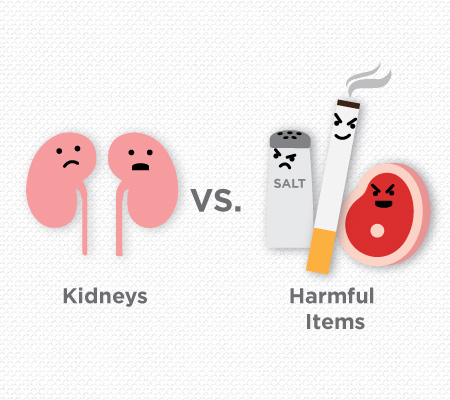
It’s important to live a healthy lifestyle to keep your kidneys going strong.
The kidney is the chemist of the body, said Dr. Brian Ewert, a Marshfield Clinic Health System nephrologist. It keeps the body’s chemicals and fluid in balance and gets rid of waste products.
Discussing dialysis
Living a healthy lifestyle is important to maintaining kidney health. People who end up on dialysis, which is a treatment meant to mimic the function of the kidney, are often those with diabetes or high blood pressure.
“Most people with high blood pressure or diabetes won’t end up on dialysis,” Ewert said. “But most people on dialysis have one of those two diseases.”
Dialysis replaces kidney function but at only 10-15 percent of normal, Ewert said.
“The lifespan of a person on dialysis is less than half that of a person the same age who is not on dialysis,” Ewert said. “Most cancer patients will live longer than patients on dialysis.”
Care of the kidney
Ewert said once people have risk factors for kidney disease they should limit red meat and salt in their diet as much as possible. A healthy, vegetable-based diet and regular exercise will help you avoid diabetes and high blood pressure, which in turn will help you avoid kidney disease.
Ewert said because of advances in medicine, the number of people with diabetes who get kidney disease has decreased dramatically over the years.
Alcohol intake does not directly cause kidney disease, although can contribute to high blood pressure. Smoking may accelerate vascular disease, which can result in decreased blood flow to the kidneys.
Defining kidney failure
Ewert said kidney failure occurs when the kidney falls to about 10 percent of its normal function. At about 60 percent of normal function, a person has chronic kidney disease.
“Kidneys are very quiet,” Ewert said. “People can get all the way to kidney failure, and they won’t have back pain, and they’ll still be passing urine. That can be confusing for people.”
Because kidneys are “quiet,” people who have risk factors for kidney disease should see their primary care provider regularly.
“People can have a substantial loss of kidney function and not have any symptoms,” Ewert said.
Other kidney health issues
Kidney stones, which are calcium buildups in the urinary tract, may be brought on by diets heavy in animal-based protein. Genetics also play a large role in determining who suffers from kidney stones. For those at risk, taking extra vitamin C or consuming foods high in oxalate also may play a role in forming stones.
Polycystic kidney disease occurs when multiple cysts develop inside the kidneys. This is a genetic disease. A person has a 50 percent chance of inheriting this disease if one parent has it, Ewert said. This disease may lead to kidney failure.
If you’re concerned about your risk for kidney disease, contact your primary care provider.


Question: How do you define "red meat"? After my grandfather had a stroke, I recall watching him carefully remove the fat from a slice of bacon and eating the lean part. Do you have any suggestions on ways to eat meat in a more healthy way? Are some meats better than others? How about lamb?
Hey, Deetje. Great questions – You'll find answers to all your above questions in this article about the connection between meat and cancer: https://shine365.marshfieldclinic.org/cancer-care/meat-and-cancer/
To summarize portions of the story for you:
"Red meat includes beef, veal, pork, lamb, mutton, horse and goat."
Additionally:
"Red meat, which provides protein and vitamin B12 for a healthy brain and nervous system, still can be included as part of a healthy diet, dietitian Chrisanne Urban said. Onitilo agreed: 'If you don’t eat any meat, you may have other health problems to contend with.'”
I hope the article I shared helps. Please let me know if you have followup questions, and thank you for reading Shine365. -Kirstie